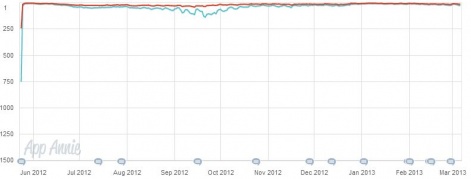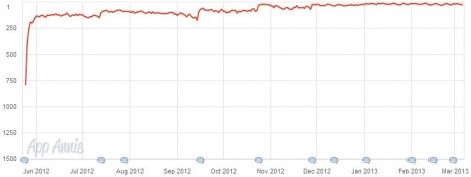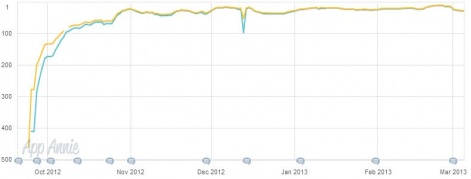That's an impressive tally, to be sure, but the game's engagement and retention rates are even more remarkable. Subway Surfers retains 91 percent of players after day one, 81 percent after a week and a tremendous 60 percent after thirty days. And, right now, the game attracts roughly 25 million daily active users.
But how does that engagement translate into revenue? For a better idea, we examined the App Store and Google Play top grossing charts.
Surfing the store
At the time of writing, Subway Surfers' is ranked at #23 on the US App Store's top grossing games charts, and at #11 in the top free games chart, a disparity that's largely down to the likes of Kingdoms of Camelot titles that don't perform strongly in the download charts but monetise extremely strongly.
In terms of downloads, Subway Surfers entered the top ten free games chart at launch, sliding slowly downwards to a low point at #40 in September 2012.

Analytics graph (courtesy of App Annie) showing Subway Surfers' performance on the US App Store's download charts. The red line denotes top free games chart performance, while the blue shows top free apps chart performance.
But Kiloo believes that Subway Surfers' position in the download charts only dipped so low because of a missed update.
The studio delivers gameplay tweaks and new content via monthly updates and its biggest drop in downloads corresponds to a late submission.
As such, the studio has consistently pushed out regular updates since then.
"I think we've updated our way to the top," explained Kiloo's creative director Simon Møller in an interview with PocketGamer.biz.
It seems to be working. Throughout the course of 2013, Subway Surfers hasn't left the top 15 free games chart.
Meanwhile, if we cast our gaze over to the US App Store's top grossing games chart, we can see that Subway Surfers has enjoyed steady growth since launch. In fact, that growth continues to this day.

Analytics graph showing Subway Surfers' performance on the US App Store's top grossing games chart.
Given the game's retention rates, this is no surprise, really. After all, the game is still attracting swathes of new players, and 60 percent of users are sticking around beyond thirty days.
Growing with Google
On Android, Subway Surfers' position on the download rankings is even higher, and although Møller tells us that iOS players monetise best right now (with Amazon Appstore users a close second), the game's download tally is growing fastest on Android.
That's backed up by the game's chart position, too. Since the start of 2013, Subway Surfers has not left the top five free games chart for Google Play.
And in terms of grossing games chart performance, Subway Surfers' has enjoyed a fairly rapid ascent, peaking as high as #10 in the top grossing games chart in February 2013.

Analytics graph showing Subway Surfers' performance on Google Play's grossing charts in the US. The yellow line denotes top grossing games, while blue shows all apps.
As is often the case on Android, the game's ranking has been less stable than on iOS, but the graph line is nonetheless trending upwards.
It's worth noting, too, that Subway Surfers also uses in-game advertising to generate revenue even from non-paying players.
It seems likely that this amounts to more than just pocket change, too, since the free-to-play title serves up one billion impressions each month.
A joint venture
Subway Surfers is more than nine months old now, and its grossing chart position is still climbing on both iOS and Google Play alike.
Couple this fact with the engagement figures Kiloo has released today, and it seems likely that Subway Surfers is built for sustainable success.

But what can we attribute this success to? Kiloo clearly believes regular content updates are important, but the studio is also pinning its success on a novel approach to game development.
This 'co-production' model sees free-to-play specialist Kiloo partner with "triple-A game developers with console and PC backgrounds."
So, Subway Surfers' core gameplay was actually designed and developed by Sybo Games, with Kiloo managing interface, monetisation, marketing, user retention and community.
All revenue is then split evenly between the two developers, so clearly the arrangement is working well for both parties right now.
Whether this co-production model can produce another success remains to be seen, but with five titles in the pipeline, it seems likely that we'll find out soon enough.





















